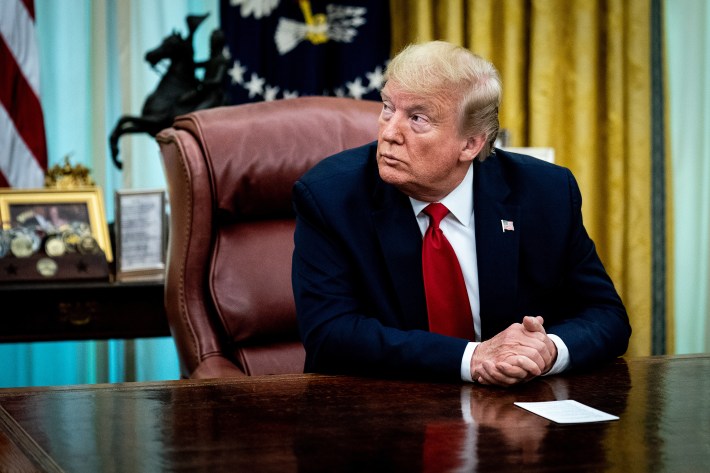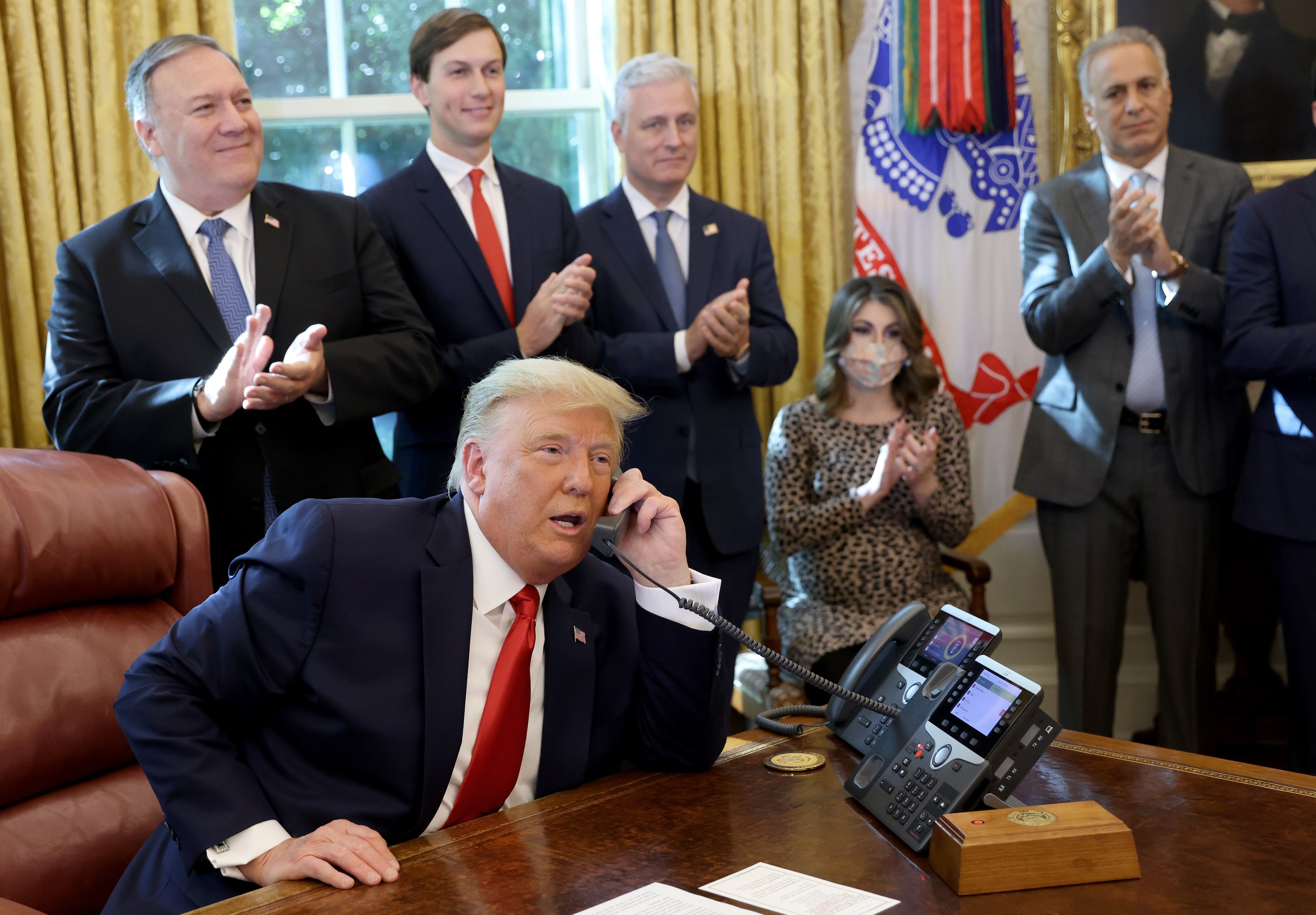There is nothing especially difficult to understand about the phone call that President Donald Trump made to Georgia Secretary of State Brad Raffensperger this weekend, which is not the same thing as saying that any of it is exactly clear. The simple stuff is simple in the way that all the most purely Trump behavior is, and characteristically exactly the oafish power play it appears to be. Trump just doesn't believe that he lost Georgia to Joe Biden in November's presidential election, and in the absence of any evidence to that effect beyond his own very powerful sense that this isn't something Trump would do, he reached for one of the most powerful tools available to any master dealsmith, which was to demand that someone he understood to be a subordinate just fucking fix it for him. In the recording of that hour-long phone call that the Washington Post released over the weekend, Trump does this sometimes in tones of peevish impatience and at other times in an oily simper, but mostly he just does it over and over again, even after it has become clear even to him that it is not working. The cumulative effect is basically that of watching a fat old housecat try to solve a Rubik's Cube.
This is more or less how Trump has handled every challenge he has ever faced, and there is amid the last thrashing, whinging, sopping-wet days of his presidency also some evidently earnest surprise at how badly that is all working this time. None of what's happening here is remotely good, all of it is ominous in ways so overt that they qualify more as "pending" than "looming," but also there is a certain bleak amusement in watching this rancid adult Fauntleroy repeatedly and abjectly fail to comprehend the idea of consequences.
The parts of the call that are hard to understand, by contrast, are hard to understand by design. The various theories and gambits and hybrid rationalizations that Trump has deployed since losing the election are vague by necessity, because there's nothing more concrete there to find; the point has always been to keep softer-brained and less-discerning types around through the next commercial break, and in a sufficiently blind and grift-amenable frenzy. In another delightful comic twist that is easier to appreciate in the abstract than from one uneasy moment to the next, Trump is both the most important character in this busy, busy trashscape and one of its most avid consumers. This means that some things tend to get lost in translation, as Trump now communicates almost entirely in its clammy patois of slang and lore and mini-stroke illogic. Trump has never quite seemed clear on what he's complaining about beyond how unfair it was to him, but also he understands it perfectly. The soap opera plot he has memorized runs in perfect parallel to observable reality, and he has conflated and confused them utterly.
And so, on his call with Raffensperger and his counsel Ryan Germany, Trump is both making a very clear demand and effectively unable even to make the allegations he wants to make, or tell the sprawling story he quite clearly believes to be true as anything more legible than a series of frantic and doddering pivots from one isolated and unsupported outrage to the next. This doesn't stop him. Trump says various large numbers in impatient ways, and asks odd heated questions about things that only people living in Trump's own fervid counter-reality could even understand, and then gets frustrated when confronted with facts that rebut his powerful feelings, or with people who can't or won't do whatever he wants whenever he tells them to, or with his ongoing inability to turn rumors he'd heard—seen online or on his TV stories, overheard in a buffet line, had whispered into his big pink ear by Corey Pavin or whatever—into actionable legal remedies. This is how he has lived, and how he has ruled, and it has left the government resembling just the sort of gilded, involuted, manifestly unworkable and multiply overleveraged luxury wreck that Trump has spent his life depositing across the globe.
Also and maybe more to the point, right around the 51:40 mark in that phone call, Trump farts. It sounds like someone blowing into a French horn full of chowder. Then there's another little one after that.
Or, in the interest of journalistic ethics, Trump probably farts. A persistent theme of body horror has been one of the subtle grace notes of Trump's fumbling coup attempt, and while Rudy Giuliani has done most of the heavy lifting—and grimacing, and melting, and also some umbrage-related farting of his own—there it stands to reason that Trump himself would take the baton at some point. As with Giuliani's outraged pwomp in front of the Michigan State Legislature, Trump appears in the clip above, which was first flagged by a keen-eared Twitter user on Sunday night, to have achieved a level of upset so severe that it can only be expressed simultaneously through equal and opposite orifices. That he offers a curt "excuse me" afterwards would, in one reading, suggest that Trump is aware of having farted, but eager to get back to the matter at hand, which is The Many Powerful Remedies That We Actually Do Have, But Which I Don't Want To Get Into.
President Trump sounded really good (strong, clear voice; no static) on the “recording” - he cares about #ElectionIntegrity, as all Americans do. Thank you, Mr. President!
— Arizona Republican Party (@AZGOP) January 3, 2021
But this is not the only reading. Trump, as befits his status as a very powerful man and his tastes as someone whose idea of A Very Powerful Man is determinedly stuck in the year 1985, sits behind the Oval Office's Resolute Desk in a great big leather chair. You can see it clearly in this photo:

This is the sort of chair that could, given the presence of a suitably heated occupant of suitably girthy ass for the better part of an hour, make the sort of agitated leather noise that sounds so much like a fart that it becomes somehow unconvincingly fart-like. Dissenting voices in Defector's newsroom have charged that this chair noise, and not anything more flatulent, is what we're hearing here. The desultory follow up poot, in this reading, is Trump doing the classic prove-it-wasn't-me-by-replicating-the-noise move that is well-known to all who have ever found themselves in similar situations. The "excuse me," in this case, is just a typically decisive executive approach to saying "it wasn't me, it was the chair." This is another reading.
Ordinarily, disputed fart stories tend to dissipate quickly before finally vanishing into thin air. They are, by their very nature, ephemeral, and even brief dispute vis-a-vis denial or supply-al is enough to consign them to a sort of permanent mystery. But for all the grim precedent-busting that the last months have delivered, there is one hopeful bit of evidence that the truth about Trump's heated moment may someday be known. Giuliani's incident in Michigan was captured from multiple angles and confirmed by a sworn member of Michigan's legislature; it is as close to an airtight example of public rage-farting as we've yet seen. While it is unlikely that we'll ever have such confirmation here—there is only the one recording, and there is the matter of Mr. Trump's executive chair—it is safe to say that precedent is no longer a guide. Anything is possible.
It is the nature of the Trump presidency that moments like this come and go frequently, arriving in rude and grandiose ways before being carried away by the next such blast, and the one after that. It fits, then, that his presidency would end on this note—in a gust or two of noise and fury, in unknowable and unanswerable dispute, in a long stupid phone call that does nothing more than poison some otherwise empty hour into submission.





